The Significance of Sleep: An ENGL 1201 Exemplification Essay
VerifiedAdded on 2022/11/22
|5
|1253
|285
Essay
AI Summary
This essay delves into the critical role of sleep in maintaining overall health and well-being, emphasizing the necessity of 7-8 hours of sleep per night. It explores the physiological impacts of sleep, highlighting how it supports brain function, memory consolidation, and emotional balance. The essay discusses the adverse effects of sleep deprivation, including increased risks of chronic diseases like diabetes, heart disease, and obesity. It also examines the impact of sleep on athletic performance, glucose metabolism, and the immune system. The essay references multiple studies to support its claims, underscoring sleep's essential function in repairing blood vessels and the heart, and ultimately advocating for prioritizing adequate sleep for improved physical and mental health, as well as enhanced daytime performance.
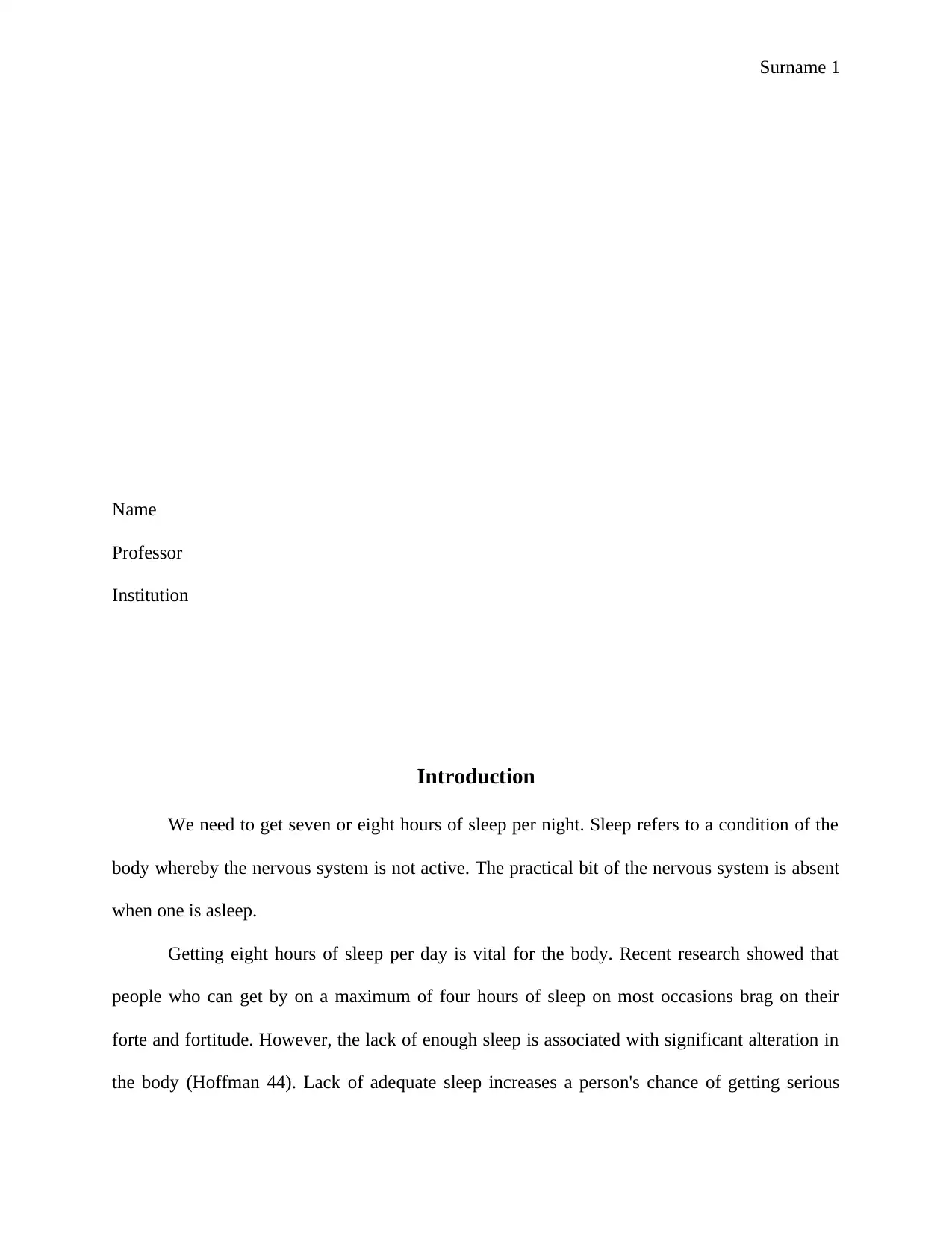
Surname 1
Name
Professor
Institution
Introduction
We need to get seven or eight hours of sleep per night. Sleep refers to a condition of the
body whereby the nervous system is not active. The practical bit of the nervous system is absent
when one is asleep.
Getting eight hours of sleep per day is vital for the body. Recent research showed that
people who can get by on a maximum of four hours of sleep on most occasions brag on their
forte and fortitude. However, the lack of enough sleep is associated with significant alteration in
the body (Hoffman 44). Lack of adequate sleep increases a person's chance of getting serious
Name
Professor
Institution
Introduction
We need to get seven or eight hours of sleep per night. Sleep refers to a condition of the
body whereby the nervous system is not active. The practical bit of the nervous system is absent
when one is asleep.
Getting eight hours of sleep per day is vital for the body. Recent research showed that
people who can get by on a maximum of four hours of sleep on most occasions brag on their
forte and fortitude. However, the lack of enough sleep is associated with significant alteration in
the body (Hoffman 44). Lack of adequate sleep increases a person's chance of getting serious
Paraphrase This Document
Need a fresh take? Get an instant paraphrase of this document with our AI Paraphraser
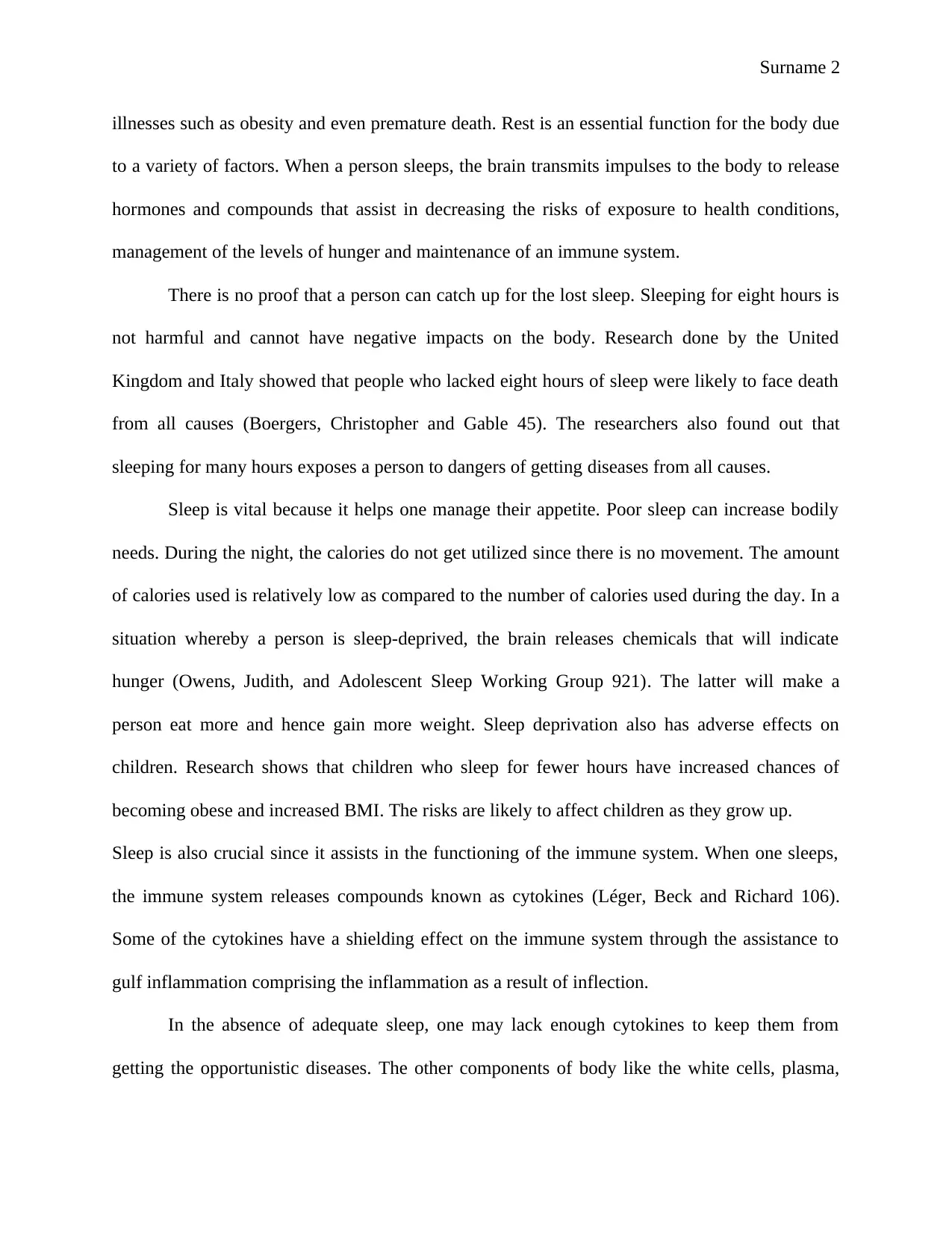
Surname 2
illnesses such as obesity and even premature death. Rest is an essential function for the body due
to a variety of factors. When a person sleeps, the brain transmits impulses to the body to release
hormones and compounds that assist in decreasing the risks of exposure to health conditions,
management of the levels of hunger and maintenance of an immune system.
There is no proof that a person can catch up for the lost sleep. Sleeping for eight hours is
not harmful and cannot have negative impacts on the body. Research done by the United
Kingdom and Italy showed that people who lacked eight hours of sleep were likely to face death
from all causes (Boergers, Christopher and Gable 45). The researchers also found out that
sleeping for many hours exposes a person to dangers of getting diseases from all causes.
Sleep is vital because it helps one manage their appetite. Poor sleep can increase bodily
needs. During the night, the calories do not get utilized since there is no movement. The amount
of calories used is relatively low as compared to the number of calories used during the day. In a
situation whereby a person is sleep-deprived, the brain releases chemicals that will indicate
hunger (Owens, Judith, and Adolescent Sleep Working Group 921). The latter will make a
person eat more and hence gain more weight. Sleep deprivation also has adverse effects on
children. Research shows that children who sleep for fewer hours have increased chances of
becoming obese and increased BMI. The risks are likely to affect children as they grow up.
Sleep is also crucial since it assists in the functioning of the immune system. When one sleeps,
the immune system releases compounds known as cytokines (Léger, Beck and Richard 106).
Some of the cytokines have a shielding effect on the immune system through the assistance to
gulf inflammation comprising the inflammation as a result of inflection.
In the absence of adequate sleep, one may lack enough cytokines to keep them from
getting the opportunistic diseases. The other components of body like the white cells, plasma,
illnesses such as obesity and even premature death. Rest is an essential function for the body due
to a variety of factors. When a person sleeps, the brain transmits impulses to the body to release
hormones and compounds that assist in decreasing the risks of exposure to health conditions,
management of the levels of hunger and maintenance of an immune system.
There is no proof that a person can catch up for the lost sleep. Sleeping for eight hours is
not harmful and cannot have negative impacts on the body. Research done by the United
Kingdom and Italy showed that people who lacked eight hours of sleep were likely to face death
from all causes (Boergers, Christopher and Gable 45). The researchers also found out that
sleeping for many hours exposes a person to dangers of getting diseases from all causes.
Sleep is vital because it helps one manage their appetite. Poor sleep can increase bodily
needs. During the night, the calories do not get utilized since there is no movement. The amount
of calories used is relatively low as compared to the number of calories used during the day. In a
situation whereby a person is sleep-deprived, the brain releases chemicals that will indicate
hunger (Owens, Judith, and Adolescent Sleep Working Group 921). The latter will make a
person eat more and hence gain more weight. Sleep deprivation also has adverse effects on
children. Research shows that children who sleep for fewer hours have increased chances of
becoming obese and increased BMI. The risks are likely to affect children as they grow up.
Sleep is also crucial since it assists in the functioning of the immune system. When one sleeps,
the immune system releases compounds known as cytokines (Léger, Beck and Richard 106).
Some of the cytokines have a shielding effect on the immune system through the assistance to
gulf inflammation comprising the inflammation as a result of inflection.
In the absence of adequate sleep, one may lack enough cytokines to keep them from
getting the opportunistic diseases. The other components of body like the white cells, plasma,
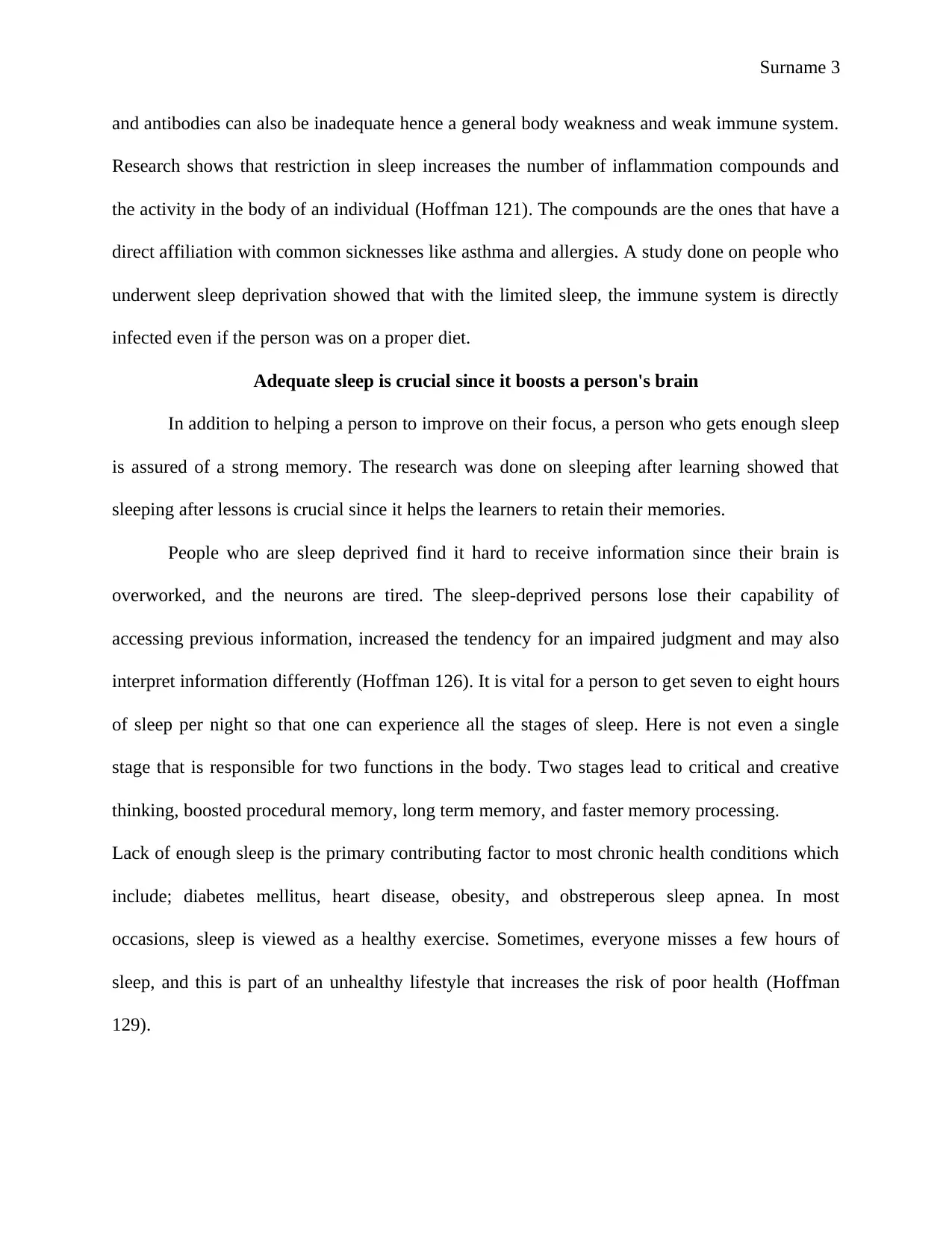
Surname 3
and antibodies can also be inadequate hence a general body weakness and weak immune system.
Research shows that restriction in sleep increases the number of inflammation compounds and
the activity in the body of an individual (Hoffman 121). The compounds are the ones that have a
direct affiliation with common sicknesses like asthma and allergies. A study done on people who
underwent sleep deprivation showed that with the limited sleep, the immune system is directly
infected even if the person was on a proper diet.
Adequate sleep is crucial since it boosts a person's brain
In addition to helping a person to improve on their focus, a person who gets enough sleep
is assured of a strong memory. The research was done on sleeping after learning showed that
sleeping after lessons is crucial since it helps the learners to retain their memories.
People who are sleep deprived find it hard to receive information since their brain is
overworked, and the neurons are tired. The sleep-deprived persons lose their capability of
accessing previous information, increased the tendency for an impaired judgment and may also
interpret information differently (Hoffman 126). It is vital for a person to get seven to eight hours
of sleep per night so that one can experience all the stages of sleep. Here is not even a single
stage that is responsible for two functions in the body. Two stages lead to critical and creative
thinking, boosted procedural memory, long term memory, and faster memory processing.
Lack of enough sleep is the primary contributing factor to most chronic health conditions which
include; diabetes mellitus, heart disease, obesity, and obstreperous sleep apnea. In most
occasions, sleep is viewed as a healthy exercise. Sometimes, everyone misses a few hours of
sleep, and this is part of an unhealthy lifestyle that increases the risk of poor health (Hoffman
129).
and antibodies can also be inadequate hence a general body weakness and weak immune system.
Research shows that restriction in sleep increases the number of inflammation compounds and
the activity in the body of an individual (Hoffman 121). The compounds are the ones that have a
direct affiliation with common sicknesses like asthma and allergies. A study done on people who
underwent sleep deprivation showed that with the limited sleep, the immune system is directly
infected even if the person was on a proper diet.
Adequate sleep is crucial since it boosts a person's brain
In addition to helping a person to improve on their focus, a person who gets enough sleep
is assured of a strong memory. The research was done on sleeping after learning showed that
sleeping after lessons is crucial since it helps the learners to retain their memories.
People who are sleep deprived find it hard to receive information since their brain is
overworked, and the neurons are tired. The sleep-deprived persons lose their capability of
accessing previous information, increased the tendency for an impaired judgment and may also
interpret information differently (Hoffman 126). It is vital for a person to get seven to eight hours
of sleep per night so that one can experience all the stages of sleep. Here is not even a single
stage that is responsible for two functions in the body. Two stages lead to critical and creative
thinking, boosted procedural memory, long term memory, and faster memory processing.
Lack of enough sleep is the primary contributing factor to most chronic health conditions which
include; diabetes mellitus, heart disease, obesity, and obstreperous sleep apnea. In most
occasions, sleep is viewed as a healthy exercise. Sometimes, everyone misses a few hours of
sleep, and this is part of an unhealthy lifestyle that increases the risk of poor health (Hoffman
129).
⊘ This is a preview!⊘
Do you want full access?
Subscribe today to unlock all pages.

Trusted by 1+ million students worldwide
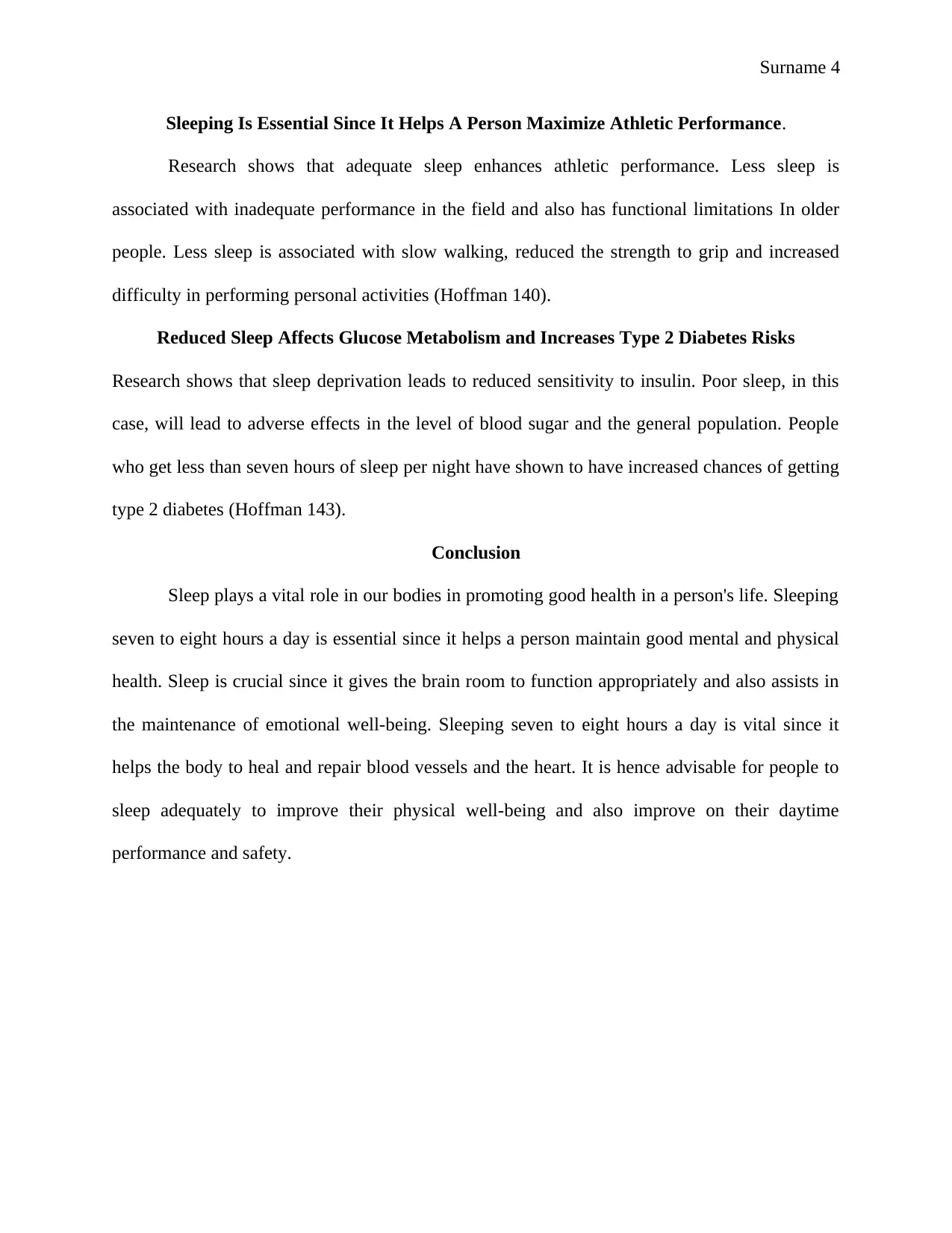
Surname 4
Sleeping Is Essential Since It Helps A Person Maximize Athletic Performance.
Research shows that adequate sleep enhances athletic performance. Less sleep is
associated with inadequate performance in the field and also has functional limitations In older
people. Less sleep is associated with slow walking, reduced the strength to grip and increased
difficulty in performing personal activities (Hoffman 140).
Reduced Sleep Affects Glucose Metabolism and Increases Type 2 Diabetes Risks
Research shows that sleep deprivation leads to reduced sensitivity to insulin. Poor sleep, in this
case, will lead to adverse effects in the level of blood sugar and the general population. People
who get less than seven hours of sleep per night have shown to have increased chances of getting
type 2 diabetes (Hoffman 143).
Conclusion
Sleep plays a vital role in our bodies in promoting good health in a person's life. Sleeping
seven to eight hours a day is essential since it helps a person maintain good mental and physical
health. Sleep is crucial since it gives the brain room to function appropriately and also assists in
the maintenance of emotional well-being. Sleeping seven to eight hours a day is vital since it
helps the body to heal and repair blood vessels and the heart. It is hence advisable for people to
sleep adequately to improve their physical well-being and also improve on their daytime
performance and safety.
Sleeping Is Essential Since It Helps A Person Maximize Athletic Performance.
Research shows that adequate sleep enhances athletic performance. Less sleep is
associated with inadequate performance in the field and also has functional limitations In older
people. Less sleep is associated with slow walking, reduced the strength to grip and increased
difficulty in performing personal activities (Hoffman 140).
Reduced Sleep Affects Glucose Metabolism and Increases Type 2 Diabetes Risks
Research shows that sleep deprivation leads to reduced sensitivity to insulin. Poor sleep, in this
case, will lead to adverse effects in the level of blood sugar and the general population. People
who get less than seven hours of sleep per night have shown to have increased chances of getting
type 2 diabetes (Hoffman 143).
Conclusion
Sleep plays a vital role in our bodies in promoting good health in a person's life. Sleeping
seven to eight hours a day is essential since it helps a person maintain good mental and physical
health. Sleep is crucial since it gives the brain room to function appropriately and also assists in
the maintenance of emotional well-being. Sleeping seven to eight hours a day is vital since it
helps the body to heal and repair blood vessels and the heart. It is hence advisable for people to
sleep adequately to improve their physical well-being and also improve on their daytime
performance and safety.
Paraphrase This Document
Need a fresh take? Get an instant paraphrase of this document with our AI Paraphraser
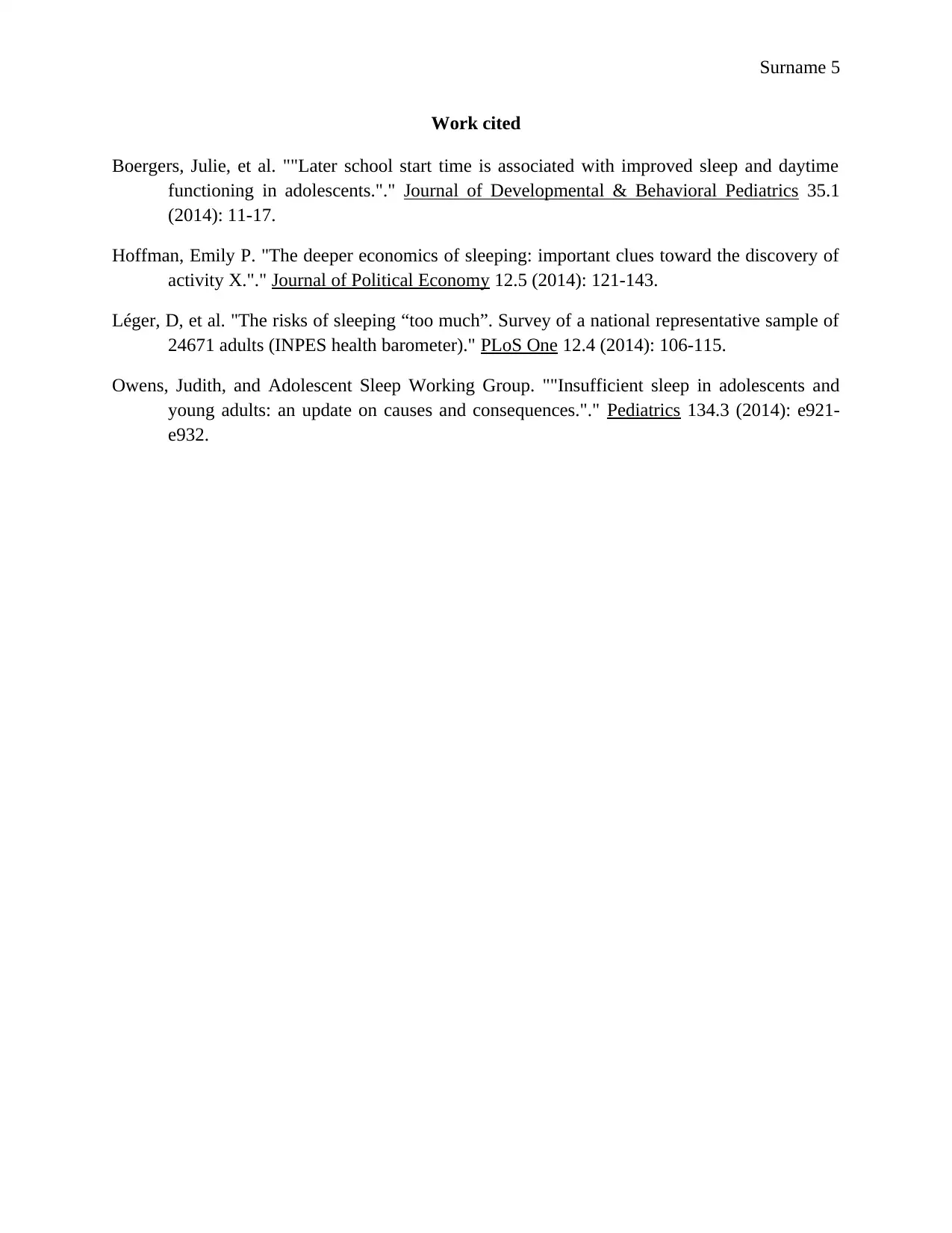
Surname 5
Work cited
Boergers, Julie, et al. ""Later school start time is associated with improved sleep and daytime
functioning in adolescents."." Journal of Developmental & Behavioral Pediatrics 35.1
(2014): 11-17.
Hoffman, Emily P. "The deeper economics of sleeping: important clues toward the discovery of
activity X."." Journal of Political Economy 12.5 (2014): 121-143.
Léger, D, et al. "The risks of sleeping “too much”. Survey of a national representative sample of
24671 adults (INPES health barometer)." PLoS One 12.4 (2014): 106-115.
Owens, Judith, and Adolescent Sleep Working Group. ""Insufficient sleep in adolescents and
young adults: an update on causes and consequences."." Pediatrics 134.3 (2014): e921-
e932.
Work cited
Boergers, Julie, et al. ""Later school start time is associated with improved sleep and daytime
functioning in adolescents."." Journal of Developmental & Behavioral Pediatrics 35.1
(2014): 11-17.
Hoffman, Emily P. "The deeper economics of sleeping: important clues toward the discovery of
activity X."." Journal of Political Economy 12.5 (2014): 121-143.
Léger, D, et al. "The risks of sleeping “too much”. Survey of a national representative sample of
24671 adults (INPES health barometer)." PLoS One 12.4 (2014): 106-115.
Owens, Judith, and Adolescent Sleep Working Group. ""Insufficient sleep in adolescents and
young adults: an update on causes and consequences."." Pediatrics 134.3 (2014): e921-
e932.
1 out of 5
Your All-in-One AI-Powered Toolkit for Academic Success.
+13062052269
info@desklib.com
Available 24*7 on WhatsApp / Email
![[object Object]](/_next/static/media/star-bottom.7253800d.svg)
Unlock your academic potential
Copyright © 2020–2026 A2Z Services. All Rights Reserved. Developed and managed by ZUCOL.
